Chebet becomes the first woman in history to beat 14 minutes for 5000m as Kipyegon improves her own 1500m mark on a day of sizzling performances at the 50th Prefontaine Classic
It is 83 years since Gunder ‘the wonder’ Hägg became the first man to break 14 minutes for 5000m with 13:58.2 in Gothenburg. On Saturday (July 5) at the 50th Pre Classic in Eugene, Oregon, there was an equally wondrous women’s performance when Beatrice Chebet became the first female to break the 14-minute barrier with 13:58.06.
At this same Diamond League meeting 12 months earlier the 25-year-old from Kenya had become the first woman to break the 29-minute barrier for 10,000m with 28:54.14. Last August also saw her claim Olympic 5000m and 10,000m titles in Paris.
Judging from her sizzling sprint finish on Saturday at Hayward Field, she looks like she could go significantly faster too. With Gudaf Tsegay of Ethiopia and Agnes Ngetich of Kenya still with her on the last lap, Chebet unleashed a 28.8-second final 200m to storm into the history books.
Ngetich held on to clock 14:01.29 – going No.3 on the world all-time rankings – as Tsegay, who held the world record with 14:00.21, faded to third in 14:04.41.
Before the Diamond League in Rome last month, we predicted that breaking 14 minutes for 5000m was far more likely than the four-minute mile barrier. Chebet ran 14:03.69 on that occasion in the Italian capital but was closer to 14 minutes than Faith Kipyegon was to the four-minute barrier in Paris at Nike’s exhibition time trial event a few days later.
“In Rome, I was running to win a race but I thought I was capable of the world record,” said Chebet, “so I went home to prepare for Eugene. I told myself ‘I have to try. If Faith is trying then why not me?’”
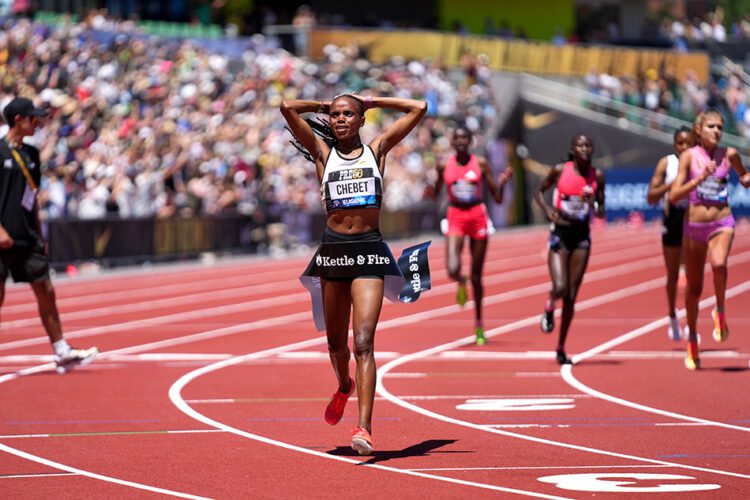
The splits saw the first kilometre passed in 2:47.07 with 2000m in 5:35.37, at which point Chebet took the lead, passing 3000m in 8:22.96 and 4000m in 11:14.12.
She added: “Hayward Field is good for me. This isn’t my first time coming here, so I can say that it’s a good track for me.”
Kipyegon was not to be outdone on Saturday. After having a gallant attempt on the four-minute barrier in Paris late last month, she came to Eugene to run the metric mile instead and managed to beat her own mark of 3:49.04, set in Paris 12 months earlier, with a superb 3:48.68.
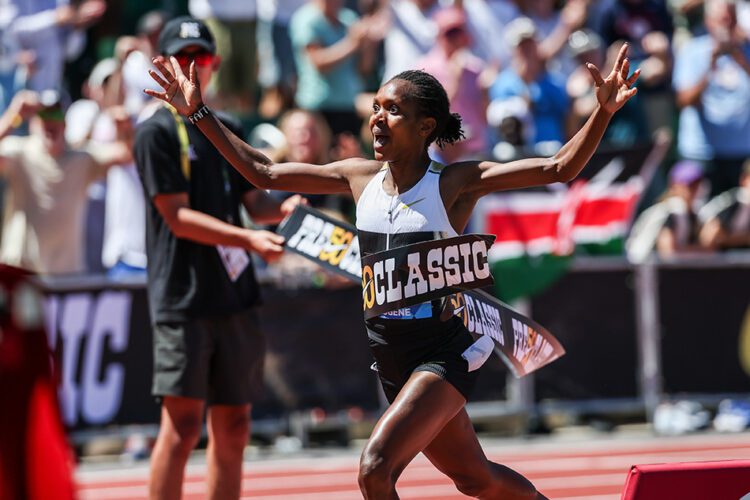
Only Jess Hull of Australia and Diribe Welteji of Ethiopia were bold enough to go with Kipyegon and Welteji was rewarded with a PB of 3:51.44 as Hull clocked 3:52.67 in third.
Currently wrestling with whether to focus on 800m or 1500m later this summer, Britain’s Georgia Hunter Bell clocked a fine season’s best of 3:54.76 in fourth with her training partner, Sarah Healy of Ireland, narrowly missing her PB in seventh in 3:57.20 as the top 11 broke four minutes.
Kipyegon’s splits were 61.9 at 400m, 2:03.4 at 800m and 3:04.7 at 1200m and she closed in with a final 200m of 28.8 – the same time as Chebet in her 5000m, albeit off a faster pace – to take 36 hundredths of a second off her world record.
When it came to fast times, the women outshone the men. But for sheer drama it was difficult to beat the Bowerman Mile.
Into the final lap, Yared Nuguse of the United States looked to have the race sewn up after breaking clear of the field with in-form Frenchman Azeddine Habz. But in a frantic final 100m, Niels Laros of the Netherlands made up a deficit of several metres to nick victory on the line by one hundredth of a second in 3:45.94.
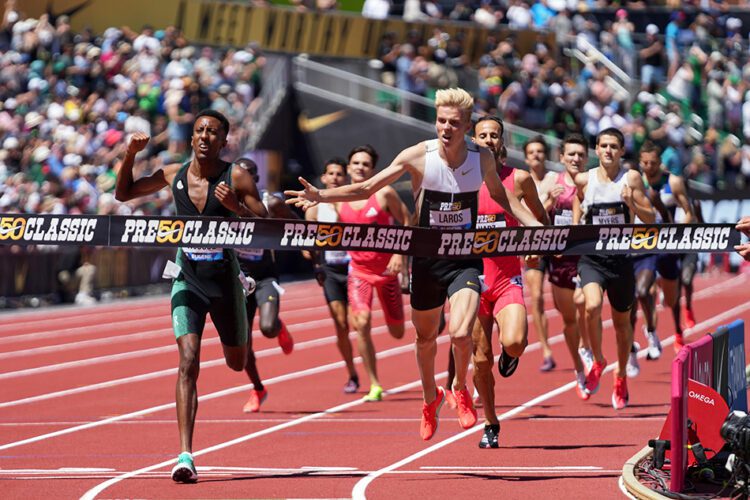
Laros had gone through 800m almost two seconds slower than Nuguse with 1:53.2 to the American’s 1:51.4. And the Dutchman was only 15th at 1000m before moving up to third at the bell. Yet he closed with every stride to run down the American.
In third place at the finish line, Habz ran a French record of 3:46.65 with Olympic champion Cole Hocker fourth in a PB of 3:47.43 and Kenyan champion Reynold Cheruiyot fifth in PB of 3:47.46.
Behind, there were fast times galore. Australian teenager Cameron Myers ran 3:47.50 in sixth. Tim Cheruiyot, the 2019 world champion from Kenya, was seventh in a PB of 3:47.71.
Jake Wightman, who won the world title on this track in 2022, clocked a PB of 3:47.82 in eighth. Grant Fisher, the Olympic 5000m and 10,000m medallist, was ninth in a PB of 3:48.29.
Neil Gourley ran a sub-3:50 mile with 3:49.41 but, such is the standard of miling right now, the Briton was only 12th.
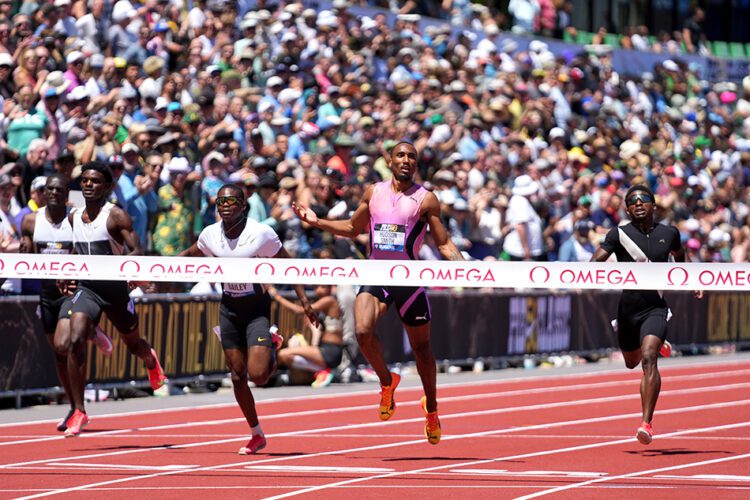
Matt Hudson-Smith struck a blow for British athletics when the Birchfield Harrier stormed to men’s 400m victory in 44.11.
Sydney McLaughlin-Levrone, meanwhile, impressed in the women’s 400m as the American 400m hurdles world record-holder won in 49.43.
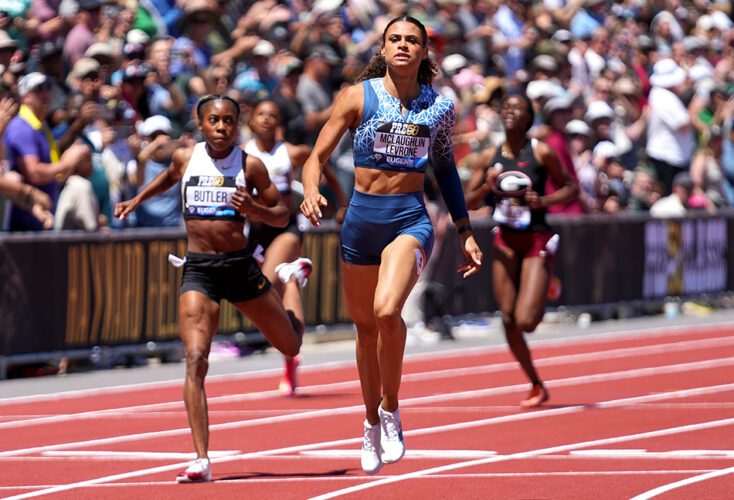
Fresh from his world 100m lead of 9.75 at the Jamaican Championships, Kishane Thompson of Jamaica won in Eugene with 9.85 (0.4) ahead of British record-holder Zharnel Hughes, with 9.91, as Trayvon Bromell of the United States was third with 9.94.
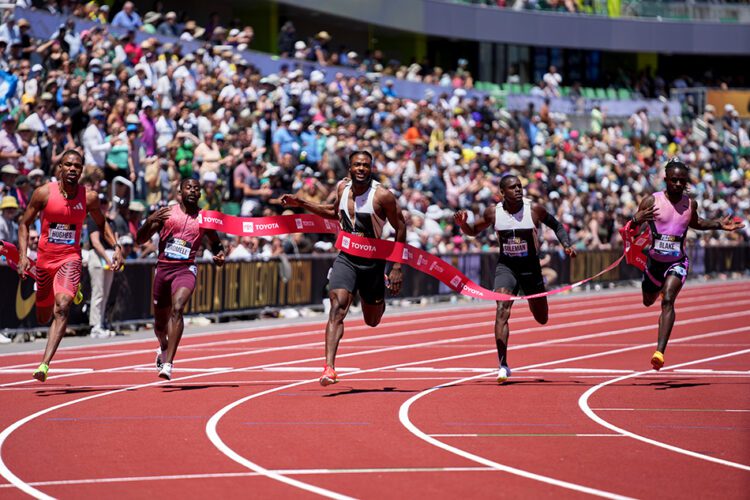
Melissa Jefferson-Wooden was similarly impressive as the American clocked 10.75 (-1.5), two hundredths of a second ahead of Olympic champion Julien Alfred of Saint Lucia as Britain’s Dina Asher-Smith was sixth in 11.14.
Letsile Tebogo, the Olympic 200m champion, hasn’t been in top form so far this summer but he enjoyed a great win in Eugene with a world lead of 19.76 (0.7) as Courtney Lindsey of the United States was runner-up in 19.87 and Alexander Ogando of the Dominican Republic third with 19.94.
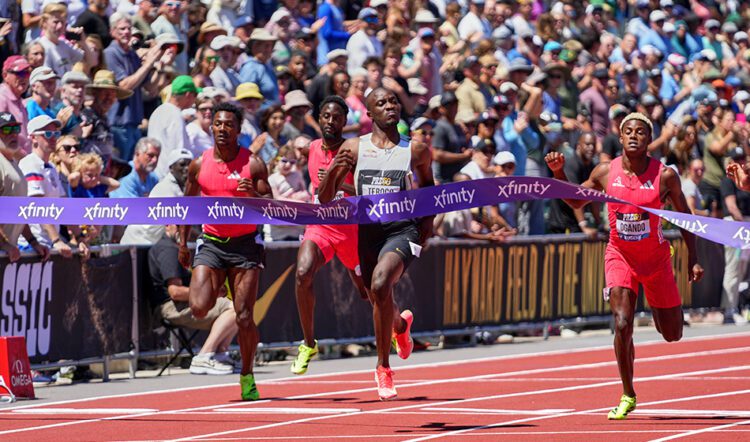
Tsigie Duguma of Ethiopia powered away to win the women’s 800m in 1:57.10 as South African Prudence Sekgodiso was runner-up in 1:57.16. Britain’s Jemma Reekie was well placed with 200m to go but fell back to finish seventh in 1:58.66.
Athing Mu-Nikolayev, meanwhile, who won the world title on this track in 2022, looked dreadfully out of shape as she finished 10th and last in 2:03.44. Mary Moraa, the 2023 world champion, was also unimpressive, finishing ninth in 2:00.51. Although at least they were racing, unlike Keely Hodgkinson, the Olympic champion, who continues her comeback from injury and is yet to race this summer.
The Pre Classic is perhaps best known for its endurance races. The meet is named after Steve Prefontaine, the iconic American distance runner who died 50 years ago, after all. But this year’s meet saw some fine field event performances as well.
Tara Davis-Woodhall set a world lead of 7.07m (1.9) in the women’s long jump in dramatic circumstances. The American, who won the Olympic title last year, was trailing Malaika Mihambo, with the German leading with 7.01m (1.8) from the fourth round. But Davis-Woodhall unleashed her winning effort in the sixth and final round before celebrating wildly in front of the Hayward Field crowd.
Discus world record-holder Mykolas Alekna returned to Hayward Field for the first time since his transfer to the University of Oregon and the Lithuanian won with 70.97m as he saw off the challenge of Ralford Mullings of Jamaica (68.98m), Daniel Stahl of Sweden (68.59m) and Olympic champion Roje Stona of Jamaica (65.62m).
Rudy Winkler broke his own US record in the men’s hammer with 83.16m as the 30-year-old from New York beat, among others, Olympic champion Ethan Katzberg of Canada. Winkler was sixth in the Olympic final last year and will be looking for a podium place at the World Champs in Tokyo in September.
Camryn Rogers excelled in the women’s hammer with a Canadian and Diamond League recored of 78.88m as she beat US duo Brooke Andersen and DeAnna Price by a couple of metres.
Joe Kovacs of the United States threw a world lead in the men’s shot of 22.48m. Chase Jackson continued her fine recent form in the women’s shot as the US record-holder threw a meet record of 20.94m to beat Canadian Sarah Mitton’s 20.39m.
Valarie Allman of the United States broke an 11-year-old meeting record in the women’s discus with a throw of 70.68m.
There were a few notable absentees from this meeting such as Noah Lyles, Jakob Ingebrigtsen, Josh Kerr, Femke Bol and Karsten Warholm. Still, it had a definitive “two-hour Olympics” feel to it.
Earlier in the programme, Biniam Mehary, 18, ran 26:43.82 to narrowly beat Olympic silver medallist Berihu Aregawi and 2021 Olympic champion Selemon Barega to win the men’s 10,000m – a race that doubled up as the Ethiopian trials for the World Champs in Tokyo.
Elsewhere, the women’s 100m hurdles saw Ackera Nugent of Jamaica clock a fast 12.32 (0.4) to beat world record-holder Tobi Amusan, the Nigerian clocking 12.38.
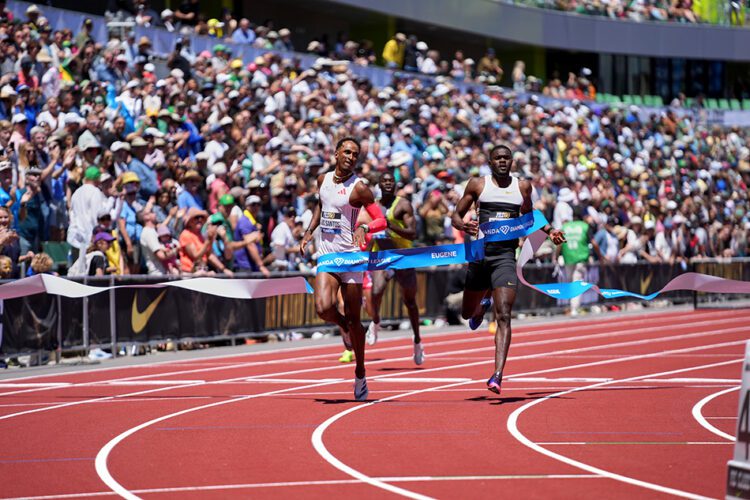
In the men’s 400m hurdles, Alison dos Santos of Brazil pipped Rai Benjamin of the United States – 46.65 to 46.71.
It’s not often that Mondo Duplantis is overshadowed but here the Swedish great won with a mere 6.00m – 20cm ahead of Sam Kendricks – after three failed attempts at a world record height of 6.29m.
When it comes to being poles apart, the night belonged to the women of Kenya.
Full results here.










